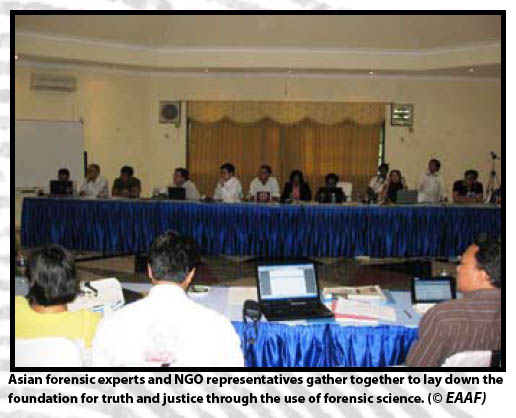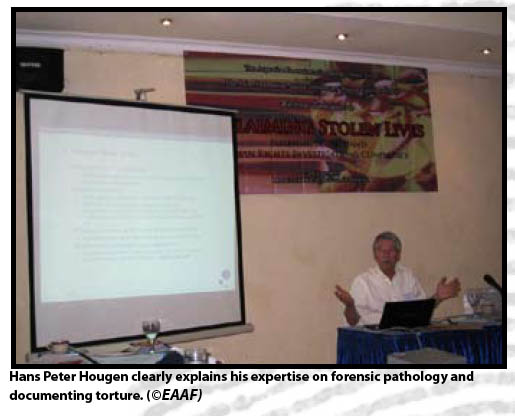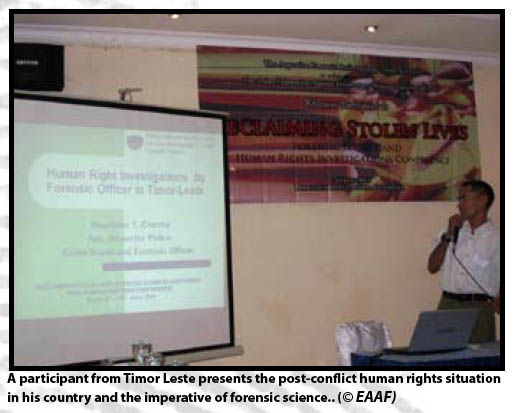Reclaiming Stolen lives:
FORENSIC SCIENCES AND HUMAN RIGHTS
INVESTIGATIONS CONFERENCE
by The Argentine Forensic Anthropology Team (Equipo Argentino de
Antropologia Forense, EAAF)
Puncak, Bogor, Indonesia, 7th – 10th June 2010
 From
7-10 June 2010, the Argentine Forensic Anthropology Team (EAAF)
and the Asian Federation Against Involuntary Disappearances (AFAD)
hosted “Reclaiming Stolen Lives: Forensic Sciences and Human Rights
Investigations Conference” in Puncak, Bogor, Indonesia. The conference
brought together 35 forensic experts, human rights activists, and
representatives of victims’ families associations from seven countries
or regions: East Timor, India, Indonesia, Kashmir, Nepal, Philippines,
and Thailand. Participants were also invited from Pakistan and Sri
Lanka, but unable to attend due to difficulties in obtaining visas.
Further, forensic experts from Latin America, Australia, and Europe
attended to deliver lectures and provide input based on their
experiences and regional perspectives. In total, 40 participants took
part in the four-day conference. The objective of the conference was for
an open discussion about the different applications of forensic sciences
to the investigation of human rights violations, as well to start a
dialogue on mutual collaboration mechanisms for non-governmental human
rights organizations and forensic practitioners from the South Asian and
South East Asian regions.
From
7-10 June 2010, the Argentine Forensic Anthropology Team (EAAF)
and the Asian Federation Against Involuntary Disappearances (AFAD)
hosted “Reclaiming Stolen Lives: Forensic Sciences and Human Rights
Investigations Conference” in Puncak, Bogor, Indonesia. The conference
brought together 35 forensic experts, human rights activists, and
representatives of victims’ families associations from seven countries
or regions: East Timor, India, Indonesia, Kashmir, Nepal, Philippines,
and Thailand. Participants were also invited from Pakistan and Sri
Lanka, but unable to attend due to difficulties in obtaining visas.
Further, forensic experts from Latin America, Australia, and Europe
attended to deliver lectures and provide input based on their
experiences and regional perspectives. In total, 40 participants took
part in the four-day conference. The objective of the conference was for
an open discussion about the different applications of forensic sciences
to the investigation of human rights violations, as well to start a
dialogue on mutual collaboration mechanisms for non-governmental human
rights organizations and forensic practitioners from the South Asian and
South East Asian regions.
The conference began with two days of training seminars on forensic
sciences, with presentations by: Luis Fondebrider (EAAF) and Soren Blau
(Victorian Institute of Forensic Medicine) on forensic anthropology and
human identification; Carlos Vullo (EAAF) on forensic genetics; and Hans
Petter Hougen (University of Copenhagen, Department of Forensic
Medicine) on forensic pathology and documenting torture. These
presentations were oriented to both the specialists and non-specialists
in the audience, and discussed how NGOs and forensic experts could
collaborate in investigations. They also covered the ethical and
bioethical considerations in doing forensic work, especially when
working with victims of torture, interacting with families of missing
individuals, protecting confidentiality of DNA samples, and working with
remains. All the presentations were followed by question & answer
sessions, and the powerpoint presentations, as well as international
protocols mentioned, were given to the participants in digital format.
 During
the third day, forensic experts and human rights activists presented on
their own local contexts. In total, 15 presentations were given (7 from
human rights NGOs, including a presentation by AFAD that covered a
regional perspective, and 8 by forensic experts). Many of these
presentations discussed local challenges faced in investigating human
rights violations, and in applying forensic sciences to these
investigations. Some common points included:
During
the third day, forensic experts and human rights activists presented on
their own local contexts. In total, 15 presentations were given (7 from
human rights NGOs, including a presentation by AFAD that covered a
regional perspective, and 8 by forensic experts). Many of these
presentations discussed local challenges faced in investigating human
rights violations, and in applying forensic sciences to these
investigations. Some common points included:

• Judicial and Legal Systems:
o No country in the region has a civil law or strong legal code to
explicitly prevent and criminalize forced disappearances.
o The international treaty against enforced disappearances has not yet
been ratified in any of the countries covered by the presentations.
o Lack of acceptance of forensic evidence and expert testimony in
courts, with a preference for witness testimonies, especially in some
cases in relation to DNA.
o Impunity in human rights cases is still prevalent, aided by the lack
of forensic evidence being used in courts.
o No legal resolution for families of disappeared persons, leading to
“half widows”, inability by families to administer the inheritance,
and children with obstacles to obtaining an education, among other
concerns.
• Investigations:
o Little political cooperation or support for forensic investigations
of human rights cases, or in providing resources for a full forensic
investigation.
o Lack of awareness among the public about a person’s rights in
regards to enforced disappearances, the possibility of a forensic
investigation, or what forensic investigators can do.
o Uneven coordination or communication between stakeholders (human
rights NGOs, forensic experts, judicial or police investigators, and
families of victims).
o Data about missing persons have been collected, but are spread
between various governmental and non-governmental organizations, and
further, in some countries, total figures vary because of differing
definitions of enforced disappearances, an absence of coordination and
due to divisions among members of civil society.
o Sometimes local forensic experts may submit conflicting or
misrepresentative reports to court, undermining the contribution of
forensic evidence.
• Forensic Capacity:
o Not all forensic experts are willing to or familiar with human
rights investigations, due to a variety of reasons like, lower pay,
safety or health concerns, or little incentive to work in the public
sector.
o Those forensic experts willing to work on human rights cases are
already overstretched.
o Lack of coordination regionally among forensic experts willing to
work on human rights cases, either to share expertise or resources.
o The local academic or institutional base to train new forensic
scientists is absent, only recently started, or not well supported.
o Need better laboratory facilities, or laboratory facilities devoted
solely to forensic investigations and not shared with other agencies.
• Exhumations:
o A lack of government policy about exhumations.
o Cultural and religious differences within countries, including
opposition to exhumations by either local population or
administration.
o When exhumations do take place, they may not have legal
authorization, or families may do the exhumations themselves, without
the involvement of forensic experts.
 On
the last day of the conference, participants held a roundtable
discussion to talk about possible joint actions, recommendations, and
collaborations that could help address these obstacles and increase
capacity for forensic work, as well as increase forensic evidence’s
application in judicial investigation. Several general recommendations
and conclusions came out of this discussion. These points are drawn
primarily from the last day of the conference, but were built out of
discussions taking place throughout the week:
On
the last day of the conference, participants held a roundtable
discussion to talk about possible joint actions, recommendations, and
collaborations that could help address these obstacles and increase
capacity for forensic work, as well as increase forensic evidence’s
application in judicial investigation. Several general recommendations
and conclusions came out of this discussion. These points are drawn
primarily from the last day of the conference, but were built out of
discussions taking place throughout the week:
• Formation of a regional network of forensic experts willing to work
on human rights cases, in order to share experiences, specialties, and
case studies, as well as to collectively raise the standard of
practice in the region.
• NGOs and victims’ families association should be aware of local
forensic capacity, and strategic in requesting assistance from
international forensic experts.
• Forensic training should be provided specifically for lawyers,
judges, and other governmental actors, in order to increase the
acceptability of forensic evidence in courts, and thus improve the
rule of law.
• The acceptance of forensic evidence in courts may also require a
regional lobbying effort, involving NGOs, victims’ families
associations, and other stakeholders, not just forensic experts.
• NGOs, working with local forensic experts, can develop plans for
collecting ante-mortem information or DNA samples, but also must take
into account how this information will be used (and safeguarded) going
forward.
• A regular meeting of forensic experts, human rights NGOs, and
victims’ families association, either locally or regionally, would
increase coordination and communication.
• Legal authorization for exhumations should be sought when possible,
but forensic experts, NGOs and victims’ families need to consider
carefully what their desires for an exhumation are, whether they want
official identifications, are seeking cause of death, or other goals,
and what are the limits and possibilities of operating if legal
authorization is difficult or not possible.
• Training programs, in forensic practices, psychosocial support, and
other topics, need to be tailored to the specific context, and to
consider what training format may be most useful in moving forward.
 Several
concrete activities were discussed for the following year, involving
collaboration between NGOs and forensic experts. The preliminary
discussions for a network of Asian forensic experts willing to work on
human rights cases and assist victims’ families associations has since
moved forward, and the association is tentatively named the Asian
Network of Forensics. The network is still in its early stages, but
an organizing committee is being formed to discuss membership and
activities, and it appears that AFAD will provide organizational support
when possible. The participants hoped such a network would contribute to
strengthening the use of forensics in human rights cases in the region.
Several
concrete activities were discussed for the following year, involving
collaboration between NGOs and forensic experts. The preliminary
discussions for a network of Asian forensic experts willing to work on
human rights cases and assist victims’ families associations has since
moved forward, and the association is tentatively named the Asian
Network of Forensics. The network is still in its early stages, but
an organizing committee is being formed to discuss membership and
activities, and it appears that AFAD will provide organizational support
when possible. The participants hoped such a network would contribute to
strengthening the use of forensics in human rights cases in the region.
EAAF
already considers the “Reclaiming Stolen Lives: Forensic Sciences and
Human Rights Investigations Conference” a very successful first step in
raising the level of regional communication and local capacity. EAAF
has also planned a series of follow-up activities to reinforce the
progress made at the conference. During 2010 and 2011, follow-up
forensic assessment visits, by AFAD and EAAF, and forensic
training visits, by EAAF and VIFM, will be made to several of the
countries participating in this conference. At the conference, EAAF
was able to discuss with many country delegates the specific needs in
their context, in order to anticipate how to tailor trainings or to plan
possible collaborative investigations. Further, EAAF has already
planned a 2011 follow-up meeting that will involve delegates reviewing
the collaborative activities in their countries in the past year, an
idea that was widely welcomed by participants, who also discussed
possibilities of funding to expand the meeting from a smaller scale
follow-up meeting to ideally a more general annual level.

The Argentine Forensic Anthropology Team (Equipo Argentino de
Antropología Forense, EAAF) is a nongovernmental, not-for-profit,
scientific organization that applies forensic sciences - mainly forensic
anthropology, archaeology, and genetics - to the investigation of human
rights violations in Argentina and worldwide. EAAF was established in
1984 to investigate the cases of at least 9,000 disappeared people in
Argentina under the military government that ruled from 1976-1983.
Today, the team has worked in more than 40 countries in the Americas,
Africa, Asia and Europe.